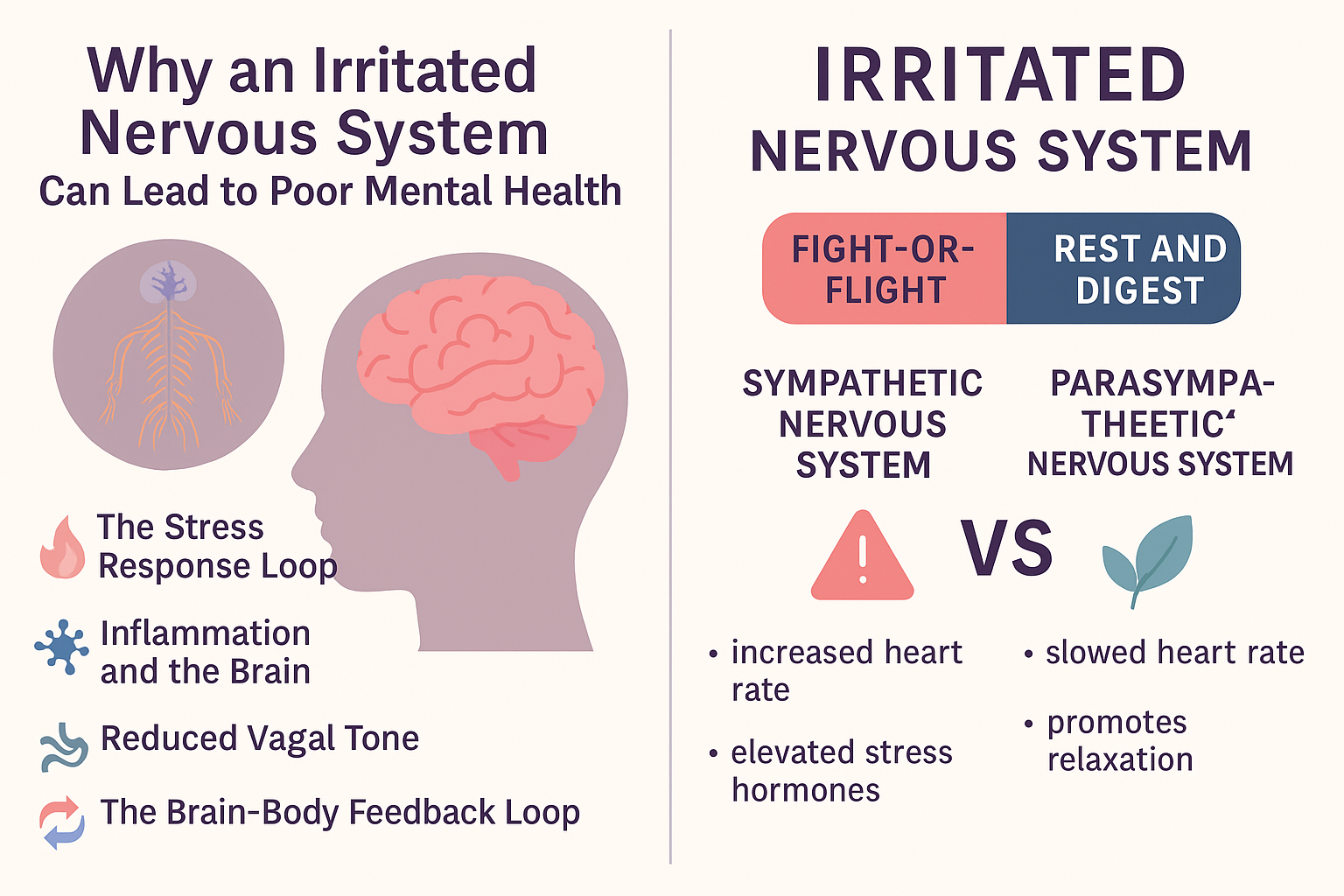The Hidden Link Between Stress and the Spine
We often talk about mental health as something purely happening “in the head.” But the truth is — it starts in the body.
Your nervous system is the bridge between your mind and your physical world. Every thought, feeling, and emotion depends on clear communication between your brain and body. When that communication becomes irritated or disrupted, everything – from mood to motivation can start to spiral.
At our Wellington chiropractic clinic, we see this every day. People walk in carrying tension, stress, or fatigue, unaware that their nervous system is stuck in overdrive. The good news? It’s something that can be changed.
When Your Nervous System Stays “On”
When the body experiences trauma, poor posture, or spinal joint dysfunction (sometimes called a subluxation), the nervous system becomes hyper-alert — stuck in a constant fight-or-flight mode.
This survival state releases stress hormones like cortisol and adrenaline, keeping you wired but not well. Over time, this leads to:
- Shallow breathing and tight muscles
- Trouble sleeping
- Racing thoughts or anxiety
- Feeling emotionally flat or drained
Chronic stress reshapes how your brain works. Studies show it can reduce activity in the prefrontal cortex (the part responsible for focus and calm thinking) and over-activate the amygdala, the brain’s emotional alarm system (Thayer & Lane, 2012; McEwen, 2017).
Inflammation: The Silent Mood Killer
An irritated nervous system doesn’t just stress you out — it can inflame your entire body.
When joint dysfunction or chronic tension persist, they create low-grade inflammation. These inflammatory molecules, known as cytokines, can travel into the brain and affect how your neurotransmitters — like serotonin and dopamine — function.
This is why ongoing pain or stress can lead to brain fog, irritability, and even depression. Researchers have repeatedly linked inflammation to mood disorders (Miller & Raison, 2016).
The Power of the Vagus Nerve
The vagus nerve acts like a brake pedal for stress — it slows your heart rate, regulates digestion, and restores emotional calm.
When your nervous system is overstimulated, vagal tone drops, meaning your body struggles to return to rest and recovery.
Low vagal tone has been associated with anxiety, poor sleep, and emotional instability (Porges, 2007).
By restoring proper motion in the spine and improving nerve communication, chiropractic adjustments may help rebalance the autonomic nervous system, boosting vagal activity and reducing sympathetic dominance (Zhang et al., 2020).
Your Body Shapes Your Mind
When spinal joints lose proper motion, the sensory feedback to your brain changes.
This creates a kind of “background noise” that distorts how your brain perceives your body — increasing tension, irritability, and mental fatigue.
The fascinating part? When the body moves better, the brain starts to calm down. Proper spinal function allows the nervous system to operate clearly, and that clarity spills over into your thoughts, focus, and emotions.
Healing the Communication Breakdown
Chiropractic care isn’t just about relieving back pain — it’s about restoring the flow of information between your brain and body.
When your nervous system is no longer irritated, your body shifts out of defence and into growth and healing.
That’s when people often report feeling lighter, calmer, and more energised — not just physically, but mentally too.
At Limitless Chiropractic in Wellington, our goal is to help you unlock that potential. Because when your nervous system is clear, you’re not just surviving — you’re thriving.
🧩 The Bottom Line
Your spine and nervous system are deeply connected to how you think, feel, and respond to life. If you’re feeling mentally or emotionally drained, your body might be trying to tell you something.
Supporting your nervous system through chiropractic care, movement, and recovery can help restore balance — so your mind and body can finally work in sync.
🔬 References
Zhang, J. et al. (2020). The effect of spinal manipulation on heart rate variability: A systematic review. Frontiers in Integrative Neuroscience, 14, 61.
Thayer, J.F. & Lane, R.D. (2012). A model of neurovisceral integration in emotion regulation and dysregulation. Journal of Affective Disorders, 61(3), 361–370.
McEwen, B.S. (2017). Neurobiological and systemic effects of chronic stress. Nature Neuroscience, 18(10), 1353–1363.
Miller, A.H. & Raison, C.L. (2016). The role of inflammation in depression. Nature Reviews Immunology, 16, 22–34.
Porges, S.W. (2007). The polyvagal perspective. Biological Psychology, 74(2), 116–143.
Experience Limitless Movement Chiropractic Care in Wellington
If you’re in Wellington and looking for expert chiropractic care, we’re here to help. At Limitless Chiropractic, we focus on helping you move better, feel stronger, and live without limits. Book your appointment today and take the first step toward a healthier, more mobile you!
Ready to begin or continue your healing journey? Let’s work together to unlock your body’s natural potential for wellness.
Book Your Limitless Journey Today
or call us at (04) 891 0911
